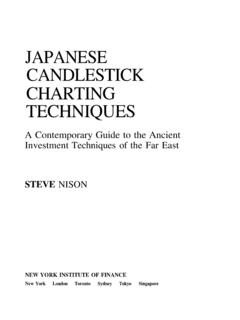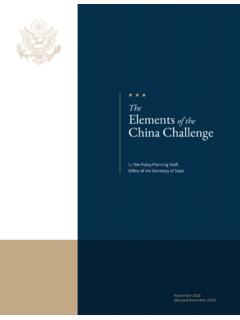Transcription of Early Career Framework - GOV.UK
1 Early Career Framework January 2019 2 Acknowledgements The Early Career Framework was developed in consultation with the following members of an Expert Advisory Group and in collaboration with a wide range of teachers, school leaders, academics and experts: Roger Pope (Chair) Education South West Becky Francis UCL Institute of Education Marie Hamer Ambition School Leadership and Institute for Teaching Jon Hutchinson Reach Academy Feltham Stuart Lock Advantage Schools Reuben Moore Teach First Cat Scutt Chartered College of Teaching A wider advisory group made up of the following members provided further support and challenge: Lucy Blewett Primary Advantage Sam Freedman Ark Education Partnerships Group Stephen Munday Teaching Schools Council, The Cam Academy Trust Hannah Nemko Dame Alice Owen s School Hamid Patel Star Academies Emma Rennison Outwood Grange Academies Trust Caroline Spalding The Bemrose School Andrew Warren Teaching Schools Council1 David Weston Teacher Development Trust The content of the Framework and its underpinning evidence has been independently assessed and endorsed by the Education Endowment Foundation (EEF).
2 1 As of 7 January 2019, Andrew Warren started a new role as West Midlands Regional School Commissioner, and is no longer a member of the advisory group. 3 Contents Acknowledgements 2 Introduction 4 High Expectations (Standard 1 Set high expectations) 8 How Pupils Learn (Standard 2 Promote good progress) 10 Subject and Curriculum (Standard 3 Demonstrate good subject and curriculum knowledge) 12 Classroom Practice (Standard 4 Plan and teach well structured lessons) 15 Adaptive Teaching (Standard 5 Adapt teaching) 17 Assessment (Standard 6 Make accurate and productive use of assessment) 19 Managing Behaviour (Standard 7 Manage behaviour effectively) 22 Professional Behaviours (Standard 8 Fulfil wider professional responsibilities)
3 24 References 26 4 Introduction Transforming the support and development offer for teachers at the start of their Career Teachers are the foundation of the education system there are no great schools without great teachers. Teachers deserve high quality support throughout their careers, particularly in those first years of teaching when the learning curve is steepest. Just as with other esteemed professions like medicine and law, teachers in the first years of their Career require high quality, structured support in order to begin the journey towards becoming an expert. During induction, it is essential that Early Career teachers are able to develop the knowledge, practices and working habits that set them up for a fulfilling and successful Career in teaching.
4 However, too often, new teachers have not enjoyed the support they need to thrive, nor have they had adequate time to devote to their professional development. The Early Career Framework (ECF) underpins an entitlement to a fully-funded, two-year package of structured training and support for Early Career teachers linked to the best available research evidence. The package of reforms will ensure new teachers have dedicated time set aside to focus on their development. Our vision is for the ECF to build on high-quality Initial Teacher Training (ITT) and become the cornerstone of a successful Career in teaching. Development of the Early Career Framework In collaboration with an Expert Advisory Group, the Department for Education consulted extensively with the sector to design the ECF.
5 This has included invaluable input from teachers, school leaders, academics and experts. The Education Endowment Foundation has independently reviewed the Framework to ensure it draws on the best available evidence and that this evidence has been interpreted with fidelity . The ECF sets out two types of content. Within each area, key evidence statements ( Learn ) have been drawn from current high-quality evidence from the UK and overseas. This evidence includes high-quality reviews and syntheses, including meta-analyses and rigorous individual studies. In addition, the ECF provides practical guidance on the skills that Early Career teachers should be supported to develop.
6 Practice statements ( Learn how ) draw on both the best available educational research and on additional guidance from the Expert Advisory Group and other sector representatives. The ECF has been designed around how to support all pupils to succeed and seeks to widen access for all. This includes those pupils identified within the four areas of need set out in the Special Educational Needs and Disability (SEND) code of practice, and children in need of help and protection as identified in the Children in Need Review. 5 References for evidence underpinning each section are provided at the end of the ECF. In each reference section, a small number of further reading items have been recommended.
7 These recommendations have been made on the basis of application (for example, taking into account the extent to which the source includes clear discussion of classroom practice) and accessibility (including whether the source is in the public domain). The ECF has been endorsed by a wide range of sector bodies including unions, teacher training providers, university researchers, headteacher groups and special educational needs and disability experts. The Chartered College of Teaching, the recently established professional body for teachers, strongly supports the Early Career Framework , and, as with the professional bodies of other esteemed professions, will continue to support the entitlement for structured support for all Early Career teachers.
8 The Early Career Framework builds on Initial Teacher Training and provides a platform for future development The content of the ECF builds on and complements ITT. The ECF underpins what all Early Career teachers should be entitled to learn about and learn how to do based on expert guidance and the best available research evidence. As is the case for other professions, areas covered in initial training will be covered in greater depth as part of induction as teachers continue on their journey to becoming experts. The ECF has been designed to support Early Career teacher development in 5 core areas behaviour management, pedagogy, curriculum, assessment and professional behaviours.
9 In order to ensure congruence with the 8 Teachers Standards, the content of the Framework is presented in 8 sections. In developing the Framework , behaviour management was thought to be encompassed by High Expectations and Managing Behaviour (S1 and S7); pedagogy was thought to be encompassed by How Pupils Learn, Classroom Practice and Adaptive Teaching (S2, S4, S5); and curriculum, assessment and professional behaviours were thought to be encompassed by S3, S6 and S8 respectively. While the ECF is presented around the Teachers Standards for clarity, the ECF is not, and should not be used, as an assessment Framework . Early Career teachers will not be expected to collect evidence against the ECF, and they will continue to be assessed against the Teachers Standards only.
10 The ECF will underpin an entitlement to training and support for Early Career teachers and should not be seen as an additional assessment tool. Part Two of the Teachers Standards defines the behaviour and attitudes which set the required standard for conduct throughout a teacher s Career . These standards must always be met and stand alongside the ECF so are not explicitly referenced within the Framework . 6 Implementing the Framework We recognise that in order for the ECF to have a positive impact on Early Career teachers, it must be firmly and exclusively about an entitlement to additional support and training. We are committed to meeting the significant investment needed to ensure the ECF delivers on its promise.












